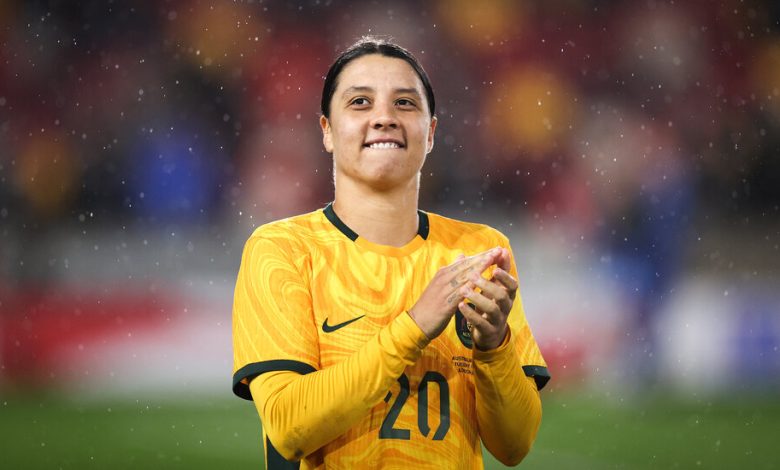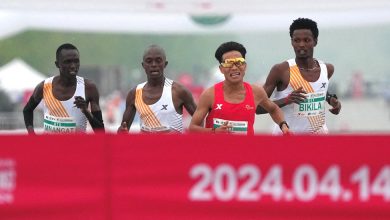Australia’s New Queen

Sam Kerr’s tone barely shifted. She had not, she said, had time to think about it yet. She had put it to the back of her mind. She had other things on which to focus her attention.
Her response muted to the point of deadpan, Kerr gave the distinct impression that the offer, to some the offer of a lifetime, was just another bullet point on a busy schedule, another item on her to-do list: Barcelona on the road. Liverpool in the league. Westminster Abbey, to act as Australia’s flag-bearer at the coronation of King Charles III. Everton away.
Of course, she said, she was conscious that being handpicked by Australia’s prime minister to carry her country’s flag at the coronation was an “amazing, amazing honor.” It would, she acknowledged, probably be the sort of thing she would “tell my kids about in 10 or 15 years.”
It was just that the idea of it did not faze her. Indeed, such was her insouciance that she admitted that her first instinct when offered the role was to turn it down. She thought she was too busy to attend a coronation. She assumed she would have a training session that day. She did not want to miss training simply to carry a flag.

Sam Kerr, left, and Australia will face Ireland in their opening game on Thursday.Credit…William West/Agence France-Presse — Getty Images
Those that know her, though, would offer a supplementary explanation. Kerr has long been regarded as possibly the finest player in women’s soccer. She was, for a time, the highest-paid female player on the planet.
Her teammates, colleagues and friends are unanimous in asserting that nothing that status has brought — the profile, the money, the attendant pressure — has left the slightest mark on her. “She comes across as real chill,” her Australia teammate Mary Fowler said. “For any of the pressure that I may feel, it’s multiplied for her. So I’m just like: Props to her for being able to deal with that and come across as if it doesn’t affect her.”
That, she said, is just who Kerr is. It is also exactly who Australia needs her to be this month as she prepares to carry her country on her shoulders once again at the Women’s World Cup.
At 29, Kerr has been a superstar for some time. Four years ago, when Chelsea was preparing its bid to sign her, the club’s management had to present a case for the investment. Both the fee to acquire her services and her salary were, at the time, substantial commitments by the standards of women’s soccer.
Their case was that the money was dwarfed by her marketability. Kerr was, by that stage, the face of the sportswear manufacturer Nike in Australia. The possibility of her signing was a driving force in the decision by Optus Sport, the Australian broadcaster, to acquire the rights to the Women’s Super League in England. Chelsea’s board was told not to consider the idea that Kerr was expensive, but to see her signing as a bargain.
This summer has borne that out. Kerr is the undisputed star, the main event, the central character of not only the biggest Women’s World Cup in history, but a World Cup that Australia desperately hopes to win on home soil.
Her image has been plastered across the country. She is front and center in all of the tournament’s marketing campaigns. She has been depicted, alongside Princess Leia and John Lennon, in a mural in the hip Sydney suburb of Marrickville, and she is on the cover of an updated edition of the FIFA video game. She has published an autobiography. She is, as her former teammate Kate Gill put it, the “poster person for the team.”
Seemingly every major news outlet has carried an account of her upbringing in Fremantle, just outside Perth, in Western Australia, detailing her family’s rich sporting background — both her father and brother played Australian Rules Football professionally — and her rise to prominence in a sport that she and her family initially “hated.”
“She is everywhere here,” said Jon Marquard, the television and media executive who pieced together that Optus deal. “If there is an icon of this World Cup, it’s her. The position she is in is actually a pretty unusual thing. In terms of universal respect, I can’t think of anyone who is on a par with her.”
Her sporting peers in Australia, instead, skew toward the historical, those whose legacies have been burnished just a little by time: the runner Cathy Freeman, the swimmer Ian Thorpe, the tennis player Ashleigh Barty. Her current peers, even in the traditional national sports cricket, both codes of rugby and the A.F.L., do not compare.
In a nation as consumed by sports as Australia — “sport to many Australians is life, and the rest a shadow,” as the essayist and thinker Donald Horne put it in 1964 — that is a considerable honor. Marquard puts that broad popularity down not only to Kerr’s achievements, particularly outside Australia, but to her nature.
“We have historically had a bit of tall poppy syndrome,” he said, referring to a situation where a person’s success causes them to be resented or criticized. “There is a cultural ethos in Australia generally of not getting above yourself. Anyone who does tends not to be seen as authentic, and that is central to the culture.
“You can respect what someone like Nick Kyrgios has done, but he can be quite divisive. Whereas Sam has none of that hubris. She’s seen as genuine. The whole team is, really: You see them spending ages chatting with fans after games. Even with all of the demands on her, Sam has stayed quite grounded. It’s quite remarkable.”
Steph Catley, a defender for Australia, put it rather more succinctly in comments to The Sydney Morning Herald. “She’s out there,” she said. “She’s very just like: ‘Blah. I’m Sam. This is me.’ She’s still like that.”
That means, rather than being intimidated by her status — and the expectation now heaped on her shoulders — Kerr seems not only to welcome it, but to encourage it. She has spoken, semi-regularly, of her hopes for this tournament and what it will provide her — and provide women’s soccer in Australia — with what she terms a “Cathy Freeman moment,” a reference to the runner’s iconic victory in the 400 meters at the 2000 Olympics in Sydney.
Guiding Australia to a World Cup win in the same stadium, Kerr has suggested, would have much the same impact on a subsequent generation of Australians.
“If the pressure’s not there, it probably means it’s not that big of a game to be honest,” she said this month. “Pressure is a privilege, and I love pressure. I love being in a moment where one or two moments can change the path of your career, really, and I think this World Cup is one of those moments.”
By the time Kerr allowed herself to think about her exact role at Westminster Abbey in May, she admitted that she did get just a little nervous. All she had to do was walk a few paces in front of the prime minister, Anthony Albanese, but she had to do it with the Australian flag on her shoulder and the eyes of the world upon her.
That was the first coronation she attended this year. Her hope is that there will be another, and one in which she will have a significantly more prominent role. The difference is that this time she is not nervous at all.




